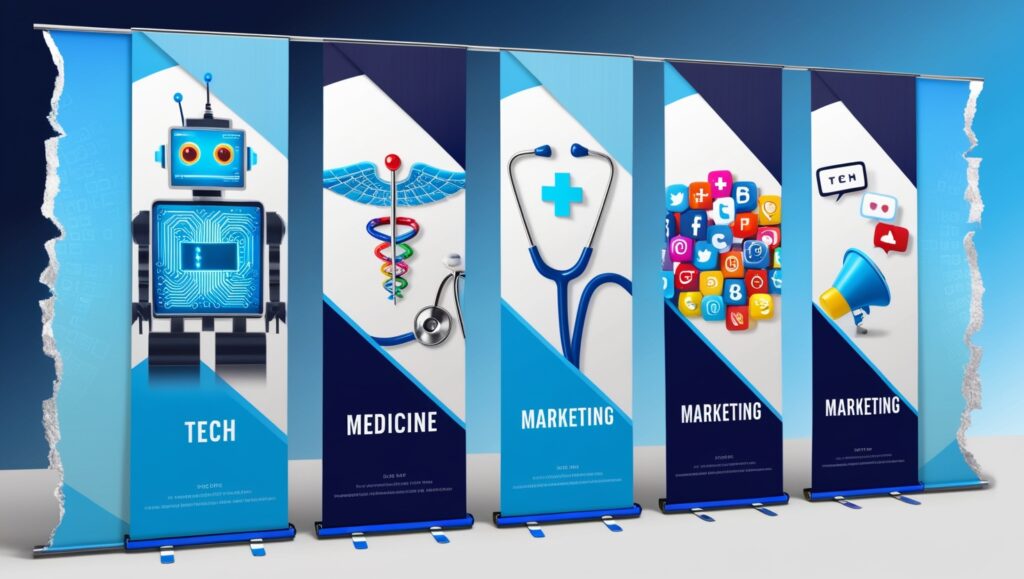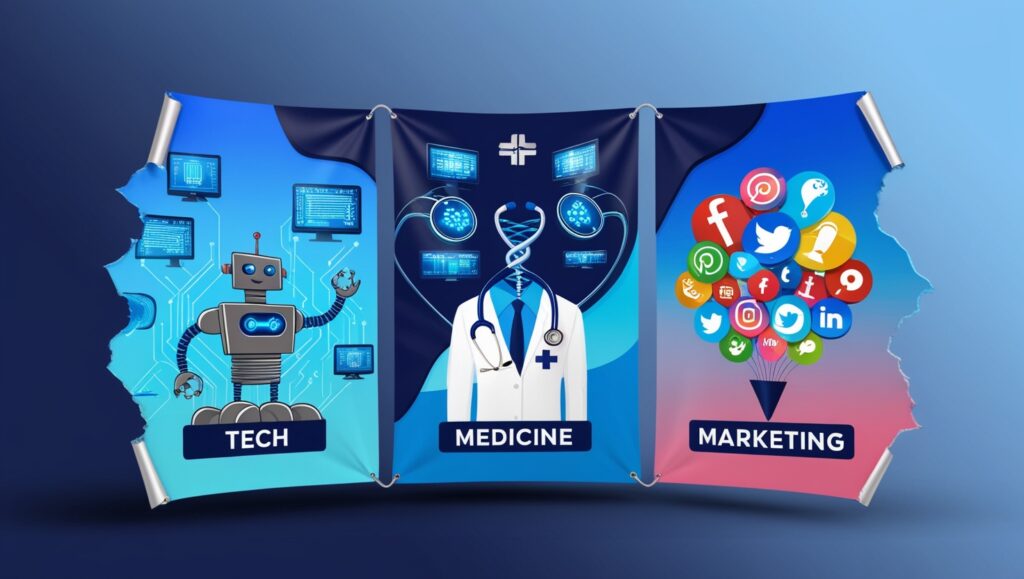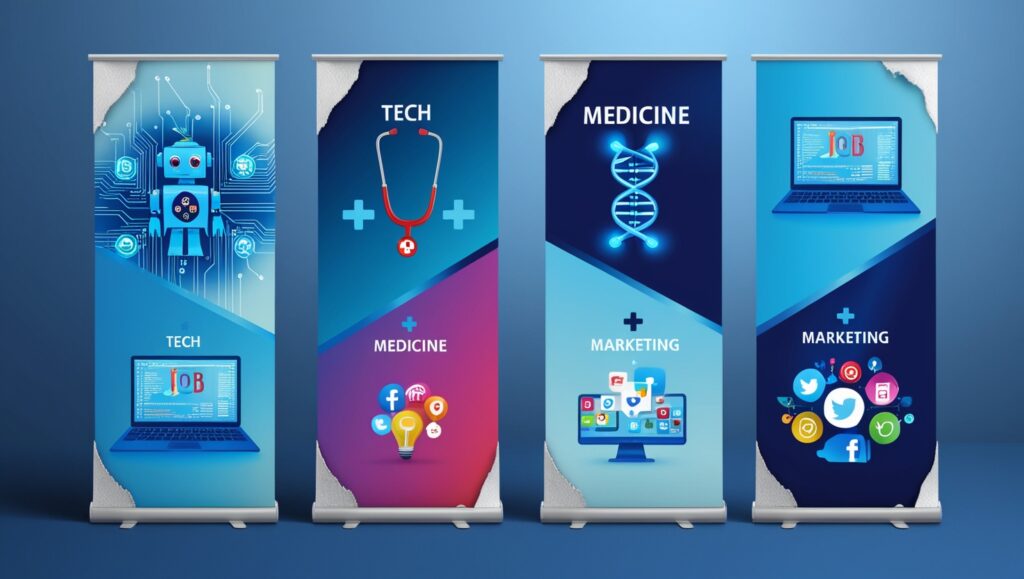Industry-Specific Internships: Launching Your Career with Precision
In today’s dynamic job market, the path from education to career is increasingly complex. Industry-specific internships have emerged as a critical bridge, offering students and recent graduates a unique opportunity to gain specialized experience and stand out in their chosen fields. These tailored programs provide a focused approach to career development, allowing participants to immerse themselves in the practical realities of their target industries.
The importance of industry-specific internships cannot be overstated. According to a 2021 National Association of Colleges and Employers (NACE) survey, 56% of students who completed an internship received at least one job offer, compared to only 36% of those without internship experience. This stark difference underscores the value employers place on practical, industry-relevant experience.
For students and recent graduates, these internships offer a multifaceted advantage. They provide hands-on experience with industry-specific tools and technologies, foster professional network development, and offer insights into industry trends and challenges. Moreover, they serve as a platform for personal growth, allowing interns to refine their career goals and develop the soft skills crucial for professional success.
Understanding Industry-Specific Internships

Definition and Distinction
Industry-specific internships are structured work experiences designed to provide practical training in a particular field or sector. Unlike general internships, which may offer broad exposure to various business functions, industry-specific internships focus on developing skills and knowledge directly relevant to a particular industry.
Key Industries and Programs
Various sectors offer specialized internship programs, reflecting the diverse landscape of modern industry. Some prominent examples include:
Technology and Software Development: Companies like Google, Microsoft, and Apple offer internships that expose students to cutting-edge technologies and development methodologies.
Finance and Investment Banking: Firms such as Goldman Sachs and JP Morgan provide programs that immerse interns in the complexities of financial markets and investment strategies.
Healthcare and Biotechnology: Organizations like Pfizer and the National Institutes of Health offer internships that combine scientific research with practical healthcare applications.
Environmental Science and Sustainability: Agencies like the Environmental Protection Agency (EPA) and companies like Tesla provide internships focused on renewable energy and environmental conservation.
Duration and Structure
The duration of industry-specific internships can vary significantly. While summer internships typically last 8-12 weeks, some programs extend to several months or even a full year. For instance, many tech companies offer year-long co-op programs, allowing students to gain more in-depth experience.
The structure of these internships often mirrors the professional environment of the industry. This may include:
Project-Based Work: Interns are often assigned real-world projects that contribute to the company’s objectives. This approach provides tangible outcomes for the intern’s portfolio and delivers value to the host organization.
Mentorship Programs: Many industry-specific internships pair interns with experienced professionals, offering guidance and insight into career paths within the field.
Training and Development: Specialized workshops and training sessions are common, ensuring interns develop both technical and soft skills relevant to their chosen industry.
Networking Opportunities: Industry events, lunch-and-learn sessions, and intern cohort activities are often integrated into the program, facilitating connections within the field.
Evaluation and Feedback: Regular performance reviews and feedback sessions are typically incorporated, mirroring professional development practices in the industry.
The specificity of these internships allows for a more targeted approach to skill development. For example, a marketing intern at a tech startup might focus on growth hacking and digital analytics, while one at a traditional consumer goods company might emphasize brand management and market research techniques.
Benefits of Industry-Specific Internships

Specialized Skill Development
Industry-specific internships provide a unique opportunity for participants to develop highly targeted skills that are in demand within their chosen field. These programs often involve hands-on experience with industry-standard tools, software, and methodologies that are not typically accessible in academic settings. For instance, a finance intern at a major investment bank might gain proficiency in financial modeling software like Bloomberg Terminal or Thomson Reuters Eikon, while a marketing intern at a digital agency could master tools like Google Analytics or HubSpot.
The depth of skill development in these internships can be substantial. A study by the National Association of Colleges and Employers (NACE) found that 79% of employers rated the quality of work produced by interns as “very good” or “excellent,” indicating that these programs effectively bridge the gap between academic knowledge and practical application.
Networking Opportunities
One of the most valuable aspects of industry-specific internships is the networking potential they offer. Interns are often placed in professional environments where they can interact with seasoned experts, industry leaders, and fellow aspiring professionals. These connections can prove invaluable for future career opportunities and professional growth.
Many companies structure their internship programs to facilitate networking. For example, Google’s internship program includes “Tech Talks” where interns can engage with industry experts, while Goldman Sachs offers mentorship programs pairing interns with experienced professionals. These interactions not only provide guidance but also help interns understand the career trajectories available within their chosen industry.
Enhanced Resume and Portfolio Building
Industry-specific internships provide concrete experiences and achievements that significantly enhance a graduate’s resume and portfolio. Unlike general internships, these specialized programs often involve working on real projects that have tangible outcomes for the host organization. This allows interns to showcase specific, industry-relevant accomplishments when applying for full-time positions.
For instance, an engineering intern at Tesla might contribute to the development of a new battery technology, while a journalism intern at The New York Times could have their articles published in the paper. These experiences demonstrate not just theoretical knowledge, but practical application of skills in a professional context.
Increased Employability
Perhaps the most significant benefit of industry-specific internships is the dramatic increase in employability they offer. According to a survey by the National Association of Colleges and Employers, 66.4% of 2020 graduates who had a relevant internship received a job offer, compared to only 43.7% of those without internship experience.
Moreover, industry-specific internships often serve as extended job interviews. Many companies use their internship programs as a pipeline for full-time hires. For example, Microsoft reports that a significant portion of their full-time employees started as interns, with conversion rates from intern to full-time employee reaching as high as 80% in some years.
Read Also:
- Detailed Guide for Virtual or Remote Internships
- Summer Internships in the USA You Can Try Today
- Job Boards and Websites to Find Internship Opportunities
Finding the Right Industry-Specific Internship
Self-Assessment: Identifying Career Goals and Interests
The first step in finding the right industry-specific internship is a thorough self-assessment. This process involves reflecting on personal interests, skills, values, and long-term career aspirations. Students and recent graduates should consider questions such as:
- What aspects of my field of study am I most passionate about?
- What kind of work environment do I thrive in?
- What are my long-term career goals, and how can an internship help me achieve them?
Career assessment tools can be valuable in this process. For instance, the Myers-Briggs Type Indicator or the Strong Interest Inventory can provide insights into personality traits and interests that align with certain industries or roles.
Researching Industries and Companies
Once career goals are clarified, the next step is to research potential industries and companies. This involves:
Industry Analysis: Study industry trends, growth projections, and major players. Resources like IBISWorld or industry-specific publications can provide valuable insights.
Company Research: Investigate potential employers, their culture, values, and internship programs. Company websites, annual reports, and platforms like Glassdoor can offer detailed information.
Informational Interviews: Reach out to professionals in target industries for informational interviews. These conversations can provide insider perspectives on the industry and potential internship opportunities.
For example, a student interested in sustainable energy might research the renewable energy sector’s growth projections, identify key players like Tesla or Vestas, and reach out to professionals in these companies for insights.
Utilizing University Career Services and Alumni Networks
University career services are invaluable resources for finding industry-specific internships. These offices often have established relationships with employers and access to exclusive internship listings. They may also offer services such as resume reviews, mock interviews, and career fairs tailored to specific industries.
Alumni networks can also be powerful tools. Many universities have alumni databases or networking platforms that allow students to connect with graduates working in their fields of interest. For instance, platforms like LinkedIn Alumni tool enable students to search for alumni by company, job title, or location, facilitating targeted networking efforts.
Online Platforms and Resources
Numerous online platforms specialize in internship listings. While general job boards like Indeed or Glassdoor can be useful, industry-specific platforms often provide more targeted opportunities. Examples include:
- Mediabistro for media and communications internships
- GitHub Jobs for software development internships
- Health eCareers for healthcare internships
Additionally, professional associations often have job boards or internship listings specific to their industry. For example, the American Marketing Association offers a marketing internship board, while the American Institute of Architects provides listings for architecture internships.
Application Process for Industry Specific Internships

Tailoring Your Resume and Cover Letter
When applying for industry-specific internships, it’s crucial to tailor your application materials to the particular industry and role. This involves highlighting relevant coursework, projects, and any previous experience that aligns with the internship’s requirements.
For your resume:
- Use industry-specific keywords and terminology
- Emphasize relevant technical skills and software proficiencies
- Highlight any industry-related projects or research
Your cover letter should demonstrate your understanding of the industry and enthusiasm for the specific role. Research the company and reference recent projects or initiatives they’ve undertaken to show your genuine interest and industry knowledge.
Building a Portfolio
For many industries, a strong portfolio is essential. This could include:
- Technical projects for software development or engineering roles
- Writing samples for journalism or content creation internships
- Design work for graphic design or architecture positions
Ensure your portfolio is easily accessible, potentially through a personal website or professional networking platform. Keep it updated with your most recent and relevant work.
Preparing for Industry-Specific Interviews
Interviews for specialized internships often include technical questions or case studies relevant to the industry. Prepare by:
- Studying industry trends and challenges
- Practicing common technical questions in your field
- Preparing examples of how you’ve solved problems related to the industry
For instance, a finance internship interview might include questions about recent market trends or ask you to analyze a company’s financial statements.
Following Up and Maintaining Professional Communication
After submitting your application or completing an interview, follow up with a thank-you note. This should reiterate your interest in the position and briefly mention a key point from your conversation.
Throughout the application process, maintain professional communication. Respond promptly to emails and be courteous in all interactions, as this reflects on your professional demeanor.
Making the Most of Your Internship
Setting Clear Goals and Expectations
To maximize the value of your industry-specific internship, begin by setting clear, achievable goals. These should align with both your personal career objectives and the expectations of your internship program. Consider:
- Skills you want to develop or improve
- Areas of the industry you want to explore
- Specific projects or outcomes you hope to achieve
Discuss these goals with your supervisor early in the internship. Many organizations, like Procter & Gamble or Goldman Sachs, have structured goal-setting processes for interns to ensure alignment between intern objectives and company needs.
Actively Seeking Learning Opportunities
Be proactive in seeking out learning experiences beyond your assigned tasks. This could involve:
- Attending company meetings or presentations
- Shadowing professionals in different roles
- Participating in training sessions or workshops
For example, if you’re interning at a tech company like Google, you might attend tech talks or coding workshops outside your immediate team to broaden your knowledge.
Building Relationships with Mentors and Colleagues
Networking is a crucial aspect of any internship. Cultivate relationships with:
- Your direct supervisor
- Team members and fellow interns
- Professionals in other departments
Many companies, such as Microsoft and IBM, have formal mentorship programs for interns. If your internship doesn’t offer this, consider seeking out an informal mentor who can provide guidance and industry insights.
Documenting Your Achievements and Projects
Keep a detailed record of your contributions and accomplishments throughout the internship. This should include:
- Projects you’ve worked on and your specific role
- Measurable outcomes or results you’ve achieved
- New skills or technologies you’ve mastered
This documentation will be invaluable when updating your resume and discussing your experience in future job interviews. It also provides concrete examples of your capabilities within the industry.
For instance, if you’re interning at a marketing agency, you might track metrics like increased engagement rates for campaigns you’ve contributed to or the number of successful pitches you’ve assisted with.
Remember to obtain permission before including any confidential information or proprietary data in your personal records.
Industry-Specific Internships in North America

Popular Industries and Companies Offering Internships
North America, particularly the United States and Canada, offers a wealth of industry-specific internship opportunities across various sectors. Some of the most prominent industries include:
Technology and Software Development: Silicon Valley giants like Apple, Google, and Facebook offer highly competitive internship programs. These often focus on cutting-edge technologies such as artificial intelligence, machine learning, and cloud computing.
Finance and Banking: Wall Street firms such as Goldman Sachs, JPMorgan Chase, and Morgan Stanley provide internships that expose students to investment banking, financial analysis, and asset management.
Healthcare and Biotechnology: Companies like Pfizer, Johnson & Johnson, and Genentech offer internships in areas such as pharmaceutical research, medical device development, and health informatics.
Aerospace and Engineering: Organizations like NASA, Boeing, and SpaceX provide internships in aerospace engineering, systems design, and advanced manufacturing.
Media and Entertainment: Conglomerates such as Disney, NBCUniversal, and Warner Bros. offer internships in areas like content production, digital marketing, and entertainment business management.
Visa Considerations for International Students
International students pursuing internships in North America must navigate specific visa requirements:
In the United States, most international students use their F-1 visa status to participate in Curricular Practical Training (CPT) or Optional Practical Training (OPT). CPT allows students to work in positions directly related to their major field of study, while OPT provides up to 12 months of work authorization after graduation, with a possible 24-month extension for STEM fields.
In Canada, international students may be eligible to work off-campus for up to 20 hours per week during regular academic sessions and full-time during scheduled breaks, provided they meet certain criteria under their study permit.
Paid vs. Unpaid Internships: Legal and Practical Considerations
The landscape of paid vs. unpaid internships in North America has evolved significantly in recent years:
In the United States, the Department of Labor has established criteria to determine whether interns must be compensated under the Fair Labor Standards Act. Most for-profit private sector internships are now paid to comply with these regulations.
According to a 2021 survey by the National Association of Colleges and Employers (NACE), approximately 66% of internships in the U.S. were paid, with an average hourly wage of $19.54.
In Canada, labor laws vary by province, but there’s a growing trend towards paid internships, particularly in competitive industries like technology and finance.
Paid internships not only provide financial support but often indicate a more structured program with defined responsibilities and learning outcomes.
Industry-Specific Internships in Nigeria
Growing Industries and Internship Opportunities
Nigeria, as Africa’s largest economy, offers a diverse range of industry-specific internship opportunities, particularly in rapidly growing sectors:
Financial Technology (Fintech): Companies like Flutterwave, Paystack, and Interswitch offer internships in areas such as mobile payment systems, blockchain technology, and financial software development.
Oil and Gas: Despite efforts to diversify, this remains a significant industry. Companies like Shell, ExxonMobil, and the Nigerian National Petroleum Corporation (NNPC) provide internships in petroleum engineering, geology, and energy management.
Telecommunications: Firms such as MTN, Airtel, and Globacom offer internships in network engineering, data analytics, and digital marketing.
Agribusiness: With a renewed focus on agriculture, companies like Olam Nigeria and Dangote Group provide internships in areas like supply chain management, food processing, and agricultural technology.
E-commerce and Logistics: Players like Jumia and Konga offer internships in digital marketing, logistics management, and software development.
Going Through the Nigerian Job Market as an Intern
Securing and maximizing an industry-specific internship in Nigeria requires understanding certain market dynamics:
Networking is crucial. Many opportunities are filled through personal connections or referrals. Leverage alumni networks, professional associations, and social media platforms like LinkedIn to build relationships in your target industry.
Be prepared for a competitive landscape. With high youth unemployment rates, internship positions often attract numerous applicants. Highlight any unique skills or experiences that set you apart.
Consider both multinational corporations and local companies. While multinationals may offer more structured programs, local companies can provide hands-on experience and greater responsibility.
Challenges and How to Overcome Them
Interns in Nigeria may face several challenges:
Infrastructure issues: Inconsistent power supply and internet connectivity can impact work, especially in tech-related fields. Be prepared with backup power sources and alternative internet options when possible.
Limited stipends: Many internships in Nigeria are unpaid or offer minimal compensation. Budget carefully and consider part-time work or scholarships to supplement your income.
Bureaucratic hurdles: Obtaining necessary documentation or permissions can be time-consuming. Start the process early and maintain patience and persistence.
Skills gap: There may be a disconnect between academic training and industry requirements. Take initiative to upskill through online courses or certifications relevant to your chosen field.
To overcome these challenges, maintain a proactive attitude, seek mentorship within your organization, and stay informed about industry trends and best practices. Despite the obstacles, industry-specific internships in Nigeria can provide valuable experience and connections in one of Africa’s most dynamic economies.
Industry-Specific Internships in Kenya

Key Sectors Offering Specialized Internships
Kenya, known as East Africa’s economic powerhouse, presents a variety of industry-specific internship opportunities across several key sectors:
Technology and Innovation: Nairobi’s thriving tech scene, often referred to as “Silicon Savannah,” offers internships in software development, mobile technology, and artificial intelligence. Companies like Safaricom, Andela, and BRCK provide opportunities for tech enthusiasts.
Financial Services: With Kenya’s pioneering mobile money system M-Pesa, fintech internships are abundant. Banks like Equity Bank and KCB, as well as fintech startups, offer positions in digital banking, financial analysis, and risk management.
Agriculture and Agribusiness: Given agriculture’s significance to Kenya’s economy, companies like Kenya Tea Development Agency and Twiga Foods offer internships in areas such as supply chain management, agronomy, and food processing.
Tourism and Hospitality: Despite recent challenges, this sector remains crucial. Establishments like Serena Hotels and Kenya Airways provide internships in hotel management, tourism marketing, and customer service.
Energy and Green Technology: With a focus on sustainable development, companies like M-KOPA Solar and Kenya Electricity Generating Company (KenGen) offer internships in renewable energy, environmental management, and sustainable engineering.
Government Initiatives Supporting Internships
The Kenyan government has implemented several initiatives to support internships:
The National Industrial Training Authority (NITA) oversees a structured Industrial Attachment program, connecting students with relevant industry placements.
The Public Service Commission of Kenya runs an internship program for recent graduates, offering placements across various government ministries and departments.
The Youth Enterprise Development Fund provides financial support to organizations that offer internships and apprenticeships to young Kenyans.
Balancing Internships with Education or Other Commitments
Many Kenyan students face the challenge of balancing internships with ongoing studies or other responsibilities:
Flexible internship models: Some companies offer part-time or project-based internships that can be more easily integrated with academic schedules.
University support: Many Kenyan universities have career services offices that help students find internships that complement their academic programs.
Remote internships: Particularly in the tech sector, remote internships are becoming more common, allowing for greater flexibility.
To manage this balance effectively, interns should:
Communicate clearly with both their academic institution and internship provider about their commitments and availability.
Develop strong time management skills, possibly utilizing tools like digital calendars and task management apps.
Prioritize tasks and be realistic about workload, ensuring that neither academic performance nor internship responsibilities suffer.
Industry-Specific Internships in South Africa

Prominent Industries for Internships
South Africa, with the continent’s most industrialized economy, offers diverse industry-specific internship opportunities:
Mining and Resources: Companies like Anglo American and Sasol offer internships in fields such as geology, chemical engineering, and environmental management.
Financial Services: Major banks like Standard Bank and Nedbank, as well as insurance companies like Old Mutual, provide internships in areas including investment banking, actuarial science, and financial technology.
Information Technology: Tech giants such as Amazon Web Services and IBM, alongside local companies like Dimension Data, offer internships in software development, cloud computing, and data science.
Automotive Manufacturing: With major players like BMW and Ford having significant operations in the country, internships are available in mechanical engineering, supply chain management, and automotive design.
Media and Communications: Media houses like Naspers and the SABC offer internships in journalism, digital marketing, and content production.
Addressing Diversity and Inclusion in Internships
South Africa’s history necessitates a strong focus on diversity and inclusion in internship programs:
Broad-Based Black Economic Empowerment (B-BBEE): Many companies align their internship programs with B-BBEE goals, actively recruiting candidates from previously disadvantaged groups.
Gender Equity: There’s an increasing emphasis on gender balance in internships, particularly in male-dominated industries like engineering and technology.
Disability Inclusion: Companies like Vodacom and Woolworths have specific internship programs designed to accommodate and empower interns with disabilities.
To promote inclusivity, many South African companies:
Partner with organizations that focus on skills development for underrepresented groups. Provide mentorship programs to support interns from diverse backgrounds. Offer unconscious bias training to existing employees to create a more inclusive workplace.
Leveraging Internships for Long-Term Career Prospects
In South Africa’s competitive job market, internships can be crucial for long-term career success:
Conversion to Permanent Roles: Many companies use internships as a pipeline for full-time hiring. For instance, professional services firms like Deloitte and PwC often offer permanent positions to successful interns.
Industry Recognition: Some internship programs, like the Allan Gray Orbis Foundation Fellowship, are highly regarded and can significantly boost a CV.
Entrepreneurship Springboard: With South Africa’s growing startup ecosystem, internships can provide valuable skills and networks for aspiring entrepreneurs.
To maximize long-term benefits, interns should:
Build a strong professional network during the internship. Seek opportunities to work on high-impact projects that demonstrate their capabilities. Stay informed about industry trends and continue learning beyond the scope of their assigned tasks.
By leveraging these industry-specific internships effectively, students and recent graduates in South Africa can gain valuable experience, contribute to workplace diversity, and position themselves for successful long-term careers in their chosen fields.
Transitioning from Internship to Full-Time Employment
Strategies for Turning Internships into Job Offers
Converting an internship into a full-time position requires strategic planning and exemplary performance:
Exceed Expectations: Go beyond assigned tasks and demonstrate initiative. For instance, an marketing intern at Unilever might propose innovative social media strategies or conduct independent market research.
Build Relationships: Network across departments and hierarchies. Attend company events, participate in team-building activities, and seek mentorship opportunities.
Express Interest: Clearly communicate your desire for full-time employment. According to a survey by the National Association of Colleges and Employers, 56.1% of interns who received full-time offers had explicitly expressed interest in such opportunities.
Solve Real Problems: Identify challenges within the organization and propose solutions. This demonstrates your value and potential long-term contribution to the company.
Maintain Professionalism: Consistently demonstrate reliability, punctuality, and a strong work ethic throughout your internship.
Negotiating Salaries and Benefits
When transitioning to full-time employment, negotiation skills become crucial:
Research Industry Standards: Use resources like Glassdoor or PayScale to understand typical compensation for your role and industry.
Highlight Your Unique Value: Emphasize specific contributions and skills you’ve developed during your internship that set you apart from external candidates.
Consider the Total Package: Look beyond base salary to benefits such as health insurance, retirement plans, professional development opportunities, and work-life balance policies.
Be Prepared to Compromise: Have a clear understanding of your priorities and where you’re willing to be flexible.
Practice Your Pitch: Rehearse your negotiation points with a mentor or career advisor to build confidence.
Maintaining Professional Relationships Post-Internship
Even if a full-time offer doesn’t materialize immediately, maintaining professional relationships is crucial:
Stay Connected: Keep in touch with colleagues and supervisors through professional networking platforms like LinkedIn.
Seek Feedback: Request a formal evaluation of your internship performance, which can provide valuable insights for future roles.
Express Gratitude: Send personalized thank-you notes to key individuals who supported your internship experience.
Update Your Network: Inform your professional contacts about your career progress and continue to engage with company updates or industry news.
Consider Alumni Networks: Many companies have formal alumni networks for former interns and employees, which can be valuable for future opportunities.
Challenges and How to Overcome Them
Balancing Internship with Studies or Other Responsibilities
Many interns face the challenge of juggling their internship with ongoing academic commitments or part-time jobs:
Time Management: Utilize digital tools like Trello or Asana to prioritize tasks and manage deadlines effectively.
Communication: Be transparent with both your employer and academic institution about your commitments. Many companies offer flexible hours for student interns.
Set Boundaries: Learn to say no to additional responsibilities that might compromise your performance in either area.
Self-Care: Don’t neglect your health and well-being. Regular exercise, sufficient sleep, and stress-management techniques are crucial for maintaining balance.
Dealing with Culture Shock in International Internships
International interns often experience culture shock, which can impact their performance and well-being:
Pre-departure Preparation: Research the host country’s culture, customs, and business etiquette. Resources like Hofstede Insights can provide valuable cultural insights.
Language Support: If working in a non-native language, seek language exchange partners or enroll in language courses to improve communication skills.
Cultural Mentorship: Many international companies offer cultural mentorship programs. Utilize these to navigate unfamiliar social and professional norms.
Stay Open-Minded: Approach cultural differences with curiosity rather than judgment. This attitude can turn challenges into learning opportunities.
Handling Difficult Work Situations or Unclear Expectations
Interns sometimes face challenging work environments or ambiguous role definitions:
Seek Clarification: Don’t hesitate to ask for more detailed instructions or feedback. Most supervisors appreciate proactive communication.
Document Your Work: Keep a record of your tasks, achievements, and challenges. This can be useful in discussions with supervisors and for your own reflection.
Find a Mentor: Seek guidance from a more experienced colleague who can offer advice on navigating workplace dynamics.
Use Problem-Solving Frameworks: Apply methodologies like the STAR method (Situation, Task, Action, Result) to address and communicate workplace challenges effectively.
Utilize HR Resources: If facing serious issues, don’t hesitate to consult your company’s HR department or intern coordinator for support.
By proactively addressing these challenges, interns can not only survive but thrive in their roles, maximizing the learning experience and potential career opportunities. Remember, overcoming such obstacles demonstrates resilience and adaptability—qualities highly valued by employers across industries.
Future Trends in Industry-Specific Internships
Remote and Virtual Internships
The global shift towards remote work has significantly impacted internship programs:
Increased Accessibility: Virtual internships remove geographical barriers, allowing students to access opportunities worldwide. For instance, a student in Lagos can now intern for a tech startup in Silicon Valley.
Digital Skill Development: Remote internships naturally cultivate skills in virtual collaboration, digital communication, and online project management—competencies increasingly valued by employers.
Flexible Models: Companies are experimenting with hybrid models, combining remote work with occasional in-person experiences. Google, for example, has adopted a flexible internship program that allows for both virtual and on-site components.
Challenges: Employers are developing innovative ways to provide mentorship, foster company culture, and facilitate networking in virtual environments. Tools like virtual reality for office tours and AI-powered networking platforms are emerging solutions.
Micro-Internships and Project-Based Experiences
The rise of micro-internships reflects a trend towards more flexible, short-term professional experiences:
Definition: Micro-internships are short-term, project-based assignments lasting from a few hours to a few weeks.
Benefits: They allow students to explore multiple industries, build diverse skill sets, and enhance their resumes without long-term commitments.
Platforms: Companies like Parker Dewey specialize in connecting students with micro-internship opportunities across various industries.
Evaluation: These experiences enable companies to evaluate potential hires based on actual work performance rather than just interviews and resumes.
Interdisciplinary Internships Combining Multiple Industries
As industries converge and innovation occurs at intersections, interdisciplinary internships are gaining prominence:
Cross-Sector Collaboration: Companies are offering internships that span multiple departments or partner with organizations in different sectors. For example, a healthcare company might offer an internship combining medical research with data science.
T-Shaped Professionals: These internships aim to develop “T-shaped” professionals who have deep expertise in one area but can collaborate across disciplines.
Innovation Focus: Interdisciplinary internships often center around innovation projects, exposing interns to design thinking, agile methodologies, and cross-functional teamwork.
Examples: Programs like the MIT Media Lab internships epitomize this trend, offering experiences that blend technology, design, and social impact.
Conclusion
Industry-specific internships serve as critical stepping stones in the journey from education to career, offering targeted experiences that shape professional trajectories. These programs provide unparalleled opportunities for skill development, networking, and industry immersion across diverse sectors and geographical locations.
From the tech hubs of North America to the emerging markets of Nigeria and Kenya, and the diverse industrial landscape of South Africa, industry-specific internships are adapting to meet the evolving needs of both employers and aspiring professionals. The future of these internships points towards increased flexibility, interdisciplinary approaches, and leveraging of digital technologies to create more accessible and impactful experiences.
Take the first step towards your career goals today. Research industry-specific internships in your field of interest, update your resume to highlight relevant skills, and reach out to your university’s career services or alumni network for guidance. Your future in your chosen industry starts with the right internship – seize the opportunity now.











2 Comments